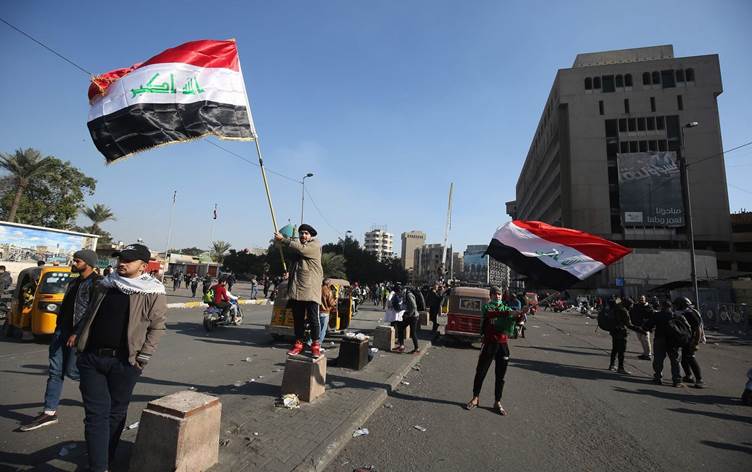
Iraqi demonstrators wave national flags during ongoing anti-government protests in Baghdad's Al Wathba square, on January 31, 2020. Photo: Ahmad al-Rubaye/AFP
ERBIL, Kurdistan Region- Iraq’s highest Shiite authority Grand Ayatollah Sistani has called for elections as the best route out of Iraq’s political impasse, according to a statement read on Friday.
Baghdad is gripped in deadlock as parliament remains unable to agree on a suitable candidate to replace caretaker Prime Minister Adil Abdul-Mahdi, who resigned as PM in November, caving to protester demands.
“The continuation of the current crisis, political, economic and security instability is not in the interest of the country or the future of its children, so there has to [be] preparation to get out of it by speeding up the formation of a new government,” Sistani said in a statement read by his representative Sheikh Abdulmahdi al-Karbalai in a Friday sermon.
If a new government is to be formed, it has to “have the confidence of the people, be able to calm the situation, reestablish the prestige of the state, and undertake the necessary steps to hold free, transparent elections as soon as possible”.
“Returning to ballot boxes to determine what the people want is the appropriate choice in the current circumstances, taking into consideration that political forces from the different components are experiencing divisions,” Sistani added.
This is not the first time Sistani has called for early elections, which have been one of the main demands of protesters on Iraq's streets since October 1, 2019.
Political parties have been scrambling to choose a candidate to form the next government, but Iraqi President Barham Salih has opposed their suggestions of mainly foreign-backed candidates, who were also rejected by demonstrators.
Salih threatened to resign in December amid ongoing pressure from political blocs to name Iran-backed candidates as the next PM.
Protestors have gained an increasingly important role; a near veto power on who can become the Prime Minister. Salih, in a message to all Shiite political parties on Wednesday, gave the blocs until Saturday to settle on a candidate.
The most recent candidates put forward by political parties are Ali al-Shukri, former Minister of Planning from 2011 to 2014 and MP from 2014 to 2018, and Mohammed Toufiq al-Alawi, who served as Minister of Communication from 2006 to 2007, and again from the end of 2010-2012, when he resigned.
The third shortlisted is Mustafah al-Kadhimi, head of the Iraqi National Intelligence Service since 2016. He has worked to purge the influence of parties over the institution, and is seen as the least partisan among the candidates.
These disagreements between parties and their unwillingness to “undertake necessary reforms demanded by most people” endanger Iraq, added Sistani. “This makes it quintessential for early elections being held quickly so that the people have their say, and the next parliament springing from it will be the one taking necessary steps for reform,” said Sistani.
A source, who wished to remain anonymous due to the sensitivity of the topic, told Rudaw on Thursday that Salih himself wants to designate al-Kadhimi as the new PM, with claims that Shiite cleric Muqtada al Sadr and previous Prime Minister Haider al-Abadi approve his candidacy.
Since last Saturday, Iraqi forces have stepped up their crackdown on protestors, mainly after Sadr, withdrew support for the protests. Since then, Iraqi forces have been able to clear protestors from some key areas they have occupied for five months.
More than 600 protesters have been killed and over 18,000 wounded since protests began.








Comments
Rudaw moderates all comments submitted on our website. We welcome comments which are relevant to the article and encourage further discussion about the issues that matter to you. We also welcome constructive criticism about Rudaw.
To be approved for publication, however, your comments must meet our community guidelines.
We will not tolerate the following: profanity, threats, personal attacks, vulgarity, abuse (such as sexism, racism, homophobia or xenophobia), or commercial or personal promotion.
Comments that do not meet our guidelines will be rejected. Comments are not edited – they are either approved or rejected.
Post a comment